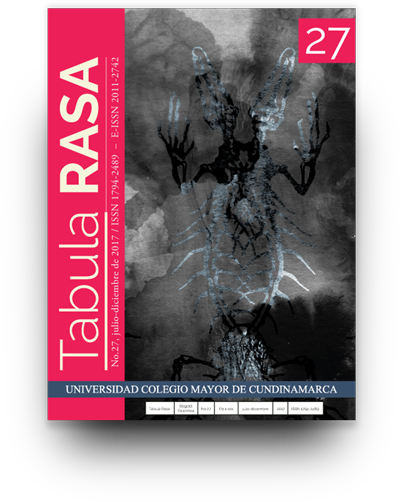Show authors biography
In this article we explore the relationship between tolerance and human rights in Uruguay, analyzing the asymmetry of purely attitudinal tolerance. This form of tolerance is unsustainable if the national community is defined based on the cultural values of the ethnic majority. We identify key moments in Uruguay’s history that demonstrate the limits of tolerance, and compare the Uruguayan case with the Australian. Instead of attitudinal tolerance, we support tolerance that arises from the reciprocal recognition of rights. This form of tolerance, enshrined in law, is possible in a nation a common project of political negotiation and civic participation in place of a singular culture that requires assimilation.
Article visits 95 | PDF visits 72
Downloads
- Achúgar, H. (1992). La balsa de la Medusa. Ensayos sobre identidad, cultura y fin de siglo en Uruguay. Montevideo: Trilce.
- Achúgar, H. (1998). Leones, cazadores e historiadores. A propósito de las políticas de la memoria y del conocimiento. Recuperado de: http://www.ensayistas.org/critica/teoria/castro/achugar.htm. Originalmente publicado en S. Castro-Gómez & E. Mendieta (Eds). Teorías sin disciplina (latinoamericanismo, poscolonialidad y globalización en debate). México: Miguel Ángel Porrúa.
- Anderson, B. (1983/2006). Imagined communities: Reflections on the origin and spread of nationalism. Londres: Verso/New Left Books.
- Andrews, G.R. (2010). Blackness in the White Nation: A History of Afro-Uruguay. Chapel Hill: University of North Carolina Press.
- Arocena, F. & Aguiar, S. (Eds.) (2007). Multiculturalismo en Uruguay: Ensayo y Entrevistas a Once Comunidades Culturales, Montevideo: Trilce.
- Asamblea General de las Naciones Unidas, (Resolución 217 A (III), del 10 de diciembre de 1948). Declaración Universal de Derechos Humanos. Recuperado de: http://www.un.org/es/documents/udhr/
- Bucheli, M. & Cabella, W. (2006). El perfil demográfico y socioeconómico de la población uruguaya según su ascendencia racial. Montevideo: Fondo de Población de las Naciones Unidas, UNDP e Instituto Nacional de Estadísticas.
- Cea d’Ancona, M.A. (2004). La activación de la xenofobia en España: ¿Qué miden las encuestas? Madrid: CIS.
- Cisneros, I.H. (1996). Tolerancia y democracia. Cuadernos de Divulgación de la Cultura Democrática, 10. Recuperado de: http://www.ife.org.mx/documentos/DECEYEC/tolerancia_y_democracia.htm#6
- Conferencia General de la Unesco (28a reunión, París, 16 de noviembre de 1995) Declaración de Principios sobre la Tolerancia. Recuperado de: http://www.unesco.org/cpp/sp/declaraciones/tolerencia.htm
- Eriksen, T.H. (1997). Multiculturalism, individualism and human rights. Romanticism, Enlightment and lessons from Mauritius, en R. Wilson (Ed.), Human Rights, Culture and Context. (pp.49-69). Londres: Pluto.
- Fopp, R. (2011). Repressive Tolerance: Herbert Marcuse’s Exercise in Social Epistemology. Social Epistemology, 24(2), 105-122.
- Foucault, M. (1997). Essential works of Michel Foucault 1954-1984 vol. 1: Ethics: subjectivity and truth (P. Rabinow, ed.). Nueva York: New Press.
- Guigou, L.N. (2010). Etnicidad y laicismo en el Uruguay. En C.M. Rita (Ed.) Un paese che cambia: Saggi antropologici sull’Uruguay tra memoria e attualità. (pp.163-181). Roma: Cisu.
- Hage, G. (1998). White nation: Fantasies of white supremacy in a multicultural society. Armidale: Pluto Press.
- Handler, M. (director). (2007). Decile a Mario que no vuelva [cinta cinematográfica]. Uruguay: Doce Gatos.
- Hentschke, J.R. (2012). Artiguista, white, cosmopolitan and educated: Constructions of nationhood in Uruguayan textbooks and related narratives, 1868-1915. Journal of Latin American Studies 44(4), 733-764.
- Kuhn, R. (2009). Xenophobic racism and class during the Howard years. Marxist Interventions, 1, 53-82. Recuperado de: http://www.anu.edu.au/polsci/mi/1/mi1kuhn.pdf
- Levy, Z. (2009). Ze’ev Levy. From Spinoza to Lévinas: On Some Hermeneutical, Ethical and Political Issues of Modern Jewish Philosophy (J. Kornberg Greenberg, ed.), Nueva York: Peter Lang.
- Luengo, E. (1998). La otredad indígena en los discursos sobre la identidad latinoamericana. Anales, 1, 37-54.
- Marcuse, H. (1965). Repressive Tolerance. En R.P. Wolff, B. Moore & H. Marcuse, A Critique of Pure Tolerance. Boston: Beacon Press.
- Murphy, A.R. (2009). Two Concepts of Tolerancja. En A.R. Murphy, J. Pluciennik, C. Russell & I. Hubner (Eds.), Literature, Culture, Tolerance. (Pp.91-102) Hamburg: Peter Lang.
- Popper, K. (1945). The Open Society and Its Enemies, Vol. 1: The Spell of Plato, Londres: Routledge.
- Porzecanski, T. y Santos, B. (Comp.) (1994). Historias de vida: negros en el Uruguay. Montevideo: Editorial Eppal.
- Porzecanski, T. (1994). Perfumes de Cartago. Montevideo: Trilce.
- Porzecanski, T. (2011). Inmigrantes. Ministerio de Educación y Cultura. Recuperado de: http://www.1811-2011.edu.uy/B1/content/inmigrantes?page=show
- Rama, G. (1987). La democracia en Uruguay. Montevideo: Arca.
- Sanguinetti, J.M. (2012). La Reconquista. Proceso de la restauración democrática en Uruguay (1980-1990), Montevideo: Taurus.
- Thomassen, L. (2006). The inclusion of the Other? Habermas and the paradox of tolerance. Political Theory, 34(4), 439-462.
- Valverde, E. (1992). The experience of Exilio and Insilio in Reshaping Uruguayan Identity. Bulletin of the Royal Institute for Inter-Faith Studies, 3(2), 177-195. Valverde, E. & Humphrey, M. Entrevistas 1989 y 2009, no publicadas.
- Valverde, E. & Humphrey, M. (2013). Uruguay. En L. Stan & N. Nedelsky (Eds.), Encyclopedia on Transitional Justice. (pp. 497-503). New York: Cambridge University Press.
- Van Krieken, R. (2005). Assimilation and liberal government. En Tim Rowse (Ed.) Contesting Assimilation. (pp.39-47). Perth: Australian Public Intellectual Network.
- Verdesio, G. (2003). An Amnesic Nation: fte Erasure of Indigenous Pasts by Uruguayan Expert Knowledges. En S. Castro-Klarén & J. Charles Chasteen (Eds.) Beyond Imagined Communities: Reading and Writing the Nation in Nineteenth-Century Latin America. (pp. 199-203). Washington: Woodrow Wilson Center Press/Baltimore & Londres: Johns Hopkins University Press.
- Zuloaga D., J.D. (2013, 30 de enero). Contra la tolerancia pura. El espectador. Recuperado de: https://www.elespectador.com/opinion/contra-la-tolerancia-pura-columna-402059.




